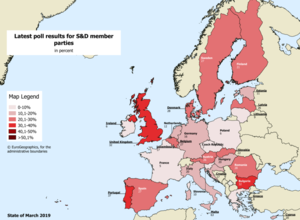FES monitor takes the pulse of EU social democracy ahead of Parliament polls
“We are currently experiencing very different tendencies and visions in Europe as to how the European Union should continue”, says Stella Meyer, who for the past 10 months has been taking the pulse of progressive parties in the European Union.
This backdrop of diverging trends makes the May elections for members of the European Parliament, the EU legislative body, one of the most important ever, according to Meyer. In this interview, we asked Meyer about the number she deals with daily as coordinator of "European Election 2019 Monitor", a project by the FES International Policy Analysis unit based in Berlin and what we can learn about the future of the European Union from the monitoring project.
What can we learn from the European Election 2019 Monitor?
The European Election 2019 Monitor observes the national polling numbers of the social democratic parties in the European Union. All parties in the European Parliament that have joined the Progressive Alliance of Socialists and Democrats (S&D) are monitored. The data comes from national surveys that are made for the European elections (if available) and national polls for the parliamentary elections, or the current mood. We then prepare the data in maps so that the situation of social democracy in Europe is clear at a glance. We started the project last summer to give us early visibility over the results and developments ahead of the elections.
How is social democracy currently faring in the EU member states?
The situation of social democratic parties regarding the European elections is not so easy to describe and varies from member state to member state. Looking at the polls of social democrats compared to the results of the most recent parliamentary elections in each country, many social democratic parties in Europe have lost support. Only in some southern countries (e.g. Spain, Portugal, Italy) there are slightly positive trends emerging.
Looking at the survey results compared to the results of the last European election in 2014, one sees that the social democratic parties have lost a lot of trust in recent years. However, poll numbers have slightly risen in recent months. All in all, it can be said that social democracy in the European Union has taken a blow, but the extent varies between member states.
Can the current rating for progressive parties in the EU members states predict the outcome of the 2019 European Parliament elections?
With our maps and database, first trends and developments can be shown. Unfortunately, we cannot provide accurate forecasts for the outcome of the election for social democratic parties at EU level. This is because individual polls for the European elections do not exist in all member states. Therefore, we have to use polls on national-level political parties and extrapolate to estimate voter preference for social democratic parties in European elections. But this is not optimal because someone who votes for a social democratic party in a national election does not necessarily do so in European polls. But there is no pan-European database on this for now, so this is the best method at our disposal.
What intrigued you the most among the findings of the Monitor?
Over the months that I have been working on this project, I have learned that we should often take a look beyond national contexts. There is much the social democratic parties can learn from each other since almost all have been or are in critical situations, and have different ways of coping with them.
The project also shows that in some European countries the poll numbers are shifting rapidly and reliable forecasts are hard to come by. Especially from the German perspective where polls are only moving very slowly, this is very exciting to watch.
Last but not least, the project shows me that we still have a way to go on the path to genuinely democratic European elections. For example, EU citizens vote together for the European Parliament, but on the basis of 28 national electoral laws. These differ, for one, in terms of the voting age and pending terms. Also, it is only possible to choose parties that are in the country or region, and no other parties, while it may be that some European party families are not available in all Member States.
A start would be a unified European pre-election monitoring, rather than 28 fragmented reports. Unfortunately, the focus is still on the national parties and not on the European party families or political groups in the European Parliament. We cannot, therefore, speak of a truly European election.
How are the 2019 European parliament elections important for the foundational pillars of the EU as a political project?
The results of the elections to the European Parliament in 2019 will be indicative of the future of the EU. We are currently experiencing very different tendencies and visions across Europe as to how the European Union should continue. On the one hand are those who demand more integration and cooperation. On the other hand, those who want to return to nationality. And then there are a few who do not want to change much about the pillars of the European Union.
The composition of the European Parliament might be an important signal for future European cooperation.
Will the polarization increase or will one of the different sides prevail? Will the European Parliament as a whole be able to agree on a common vision and direction for European integration, thus playing a decisive role in the further development of the EU, or, in the end, will it fail to play an effective role because of many fragmented fractions with adversarial positions? These are the questions at the moment that make the European election 2019 one of the bloc’s most important to date.
###
Stella Meyer studied political management and political science with a focus on issues of European integration. She is coordinating the project "European Election 2019 Monitor" (link) for the International Policy Analysis unit in FES Berlin.
About FES Connect
Connecting people, in the spirit of social democracy, we source and share content in English from the German and international network of the Friedrich-Ebert-Stiftung.







